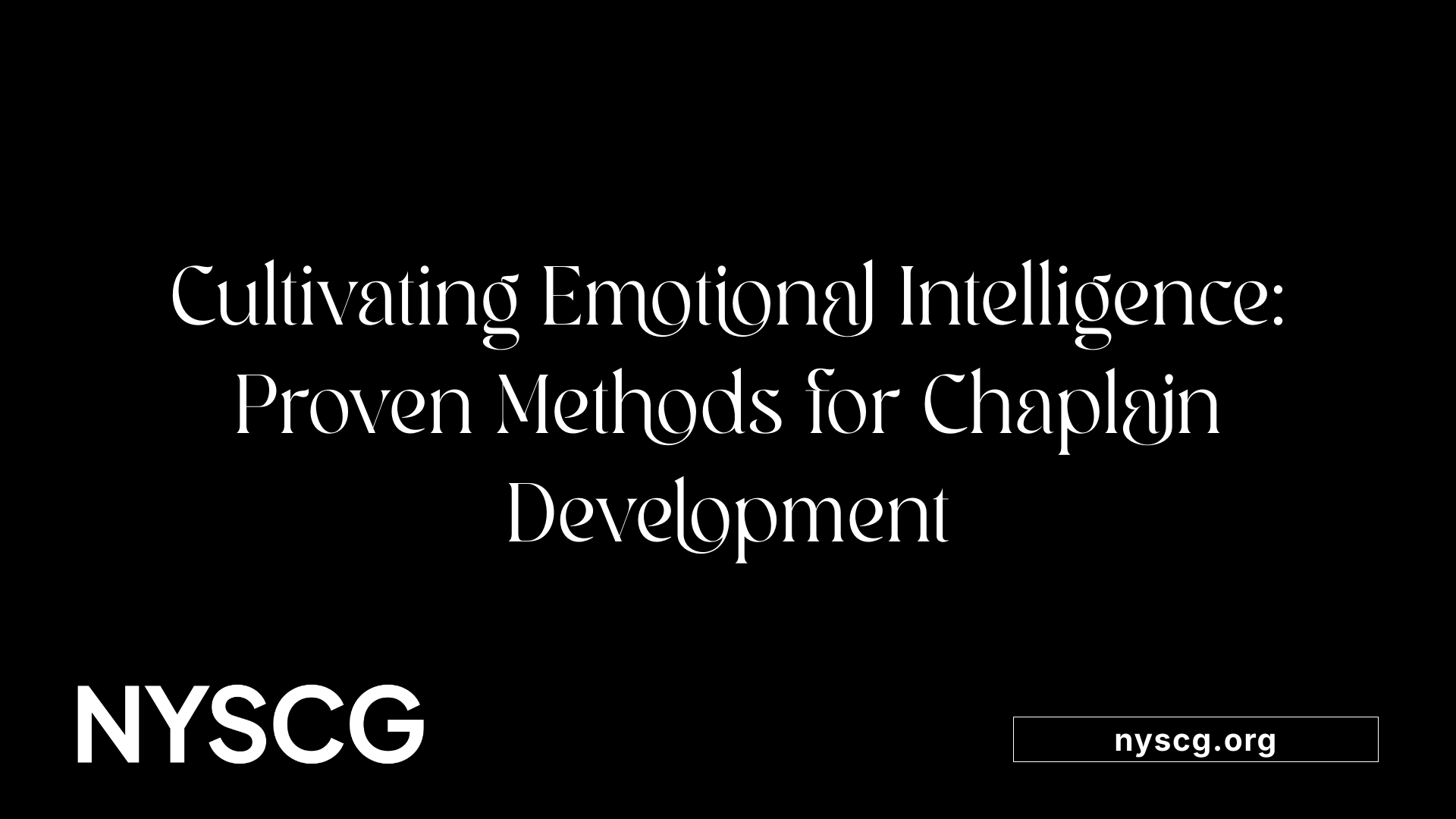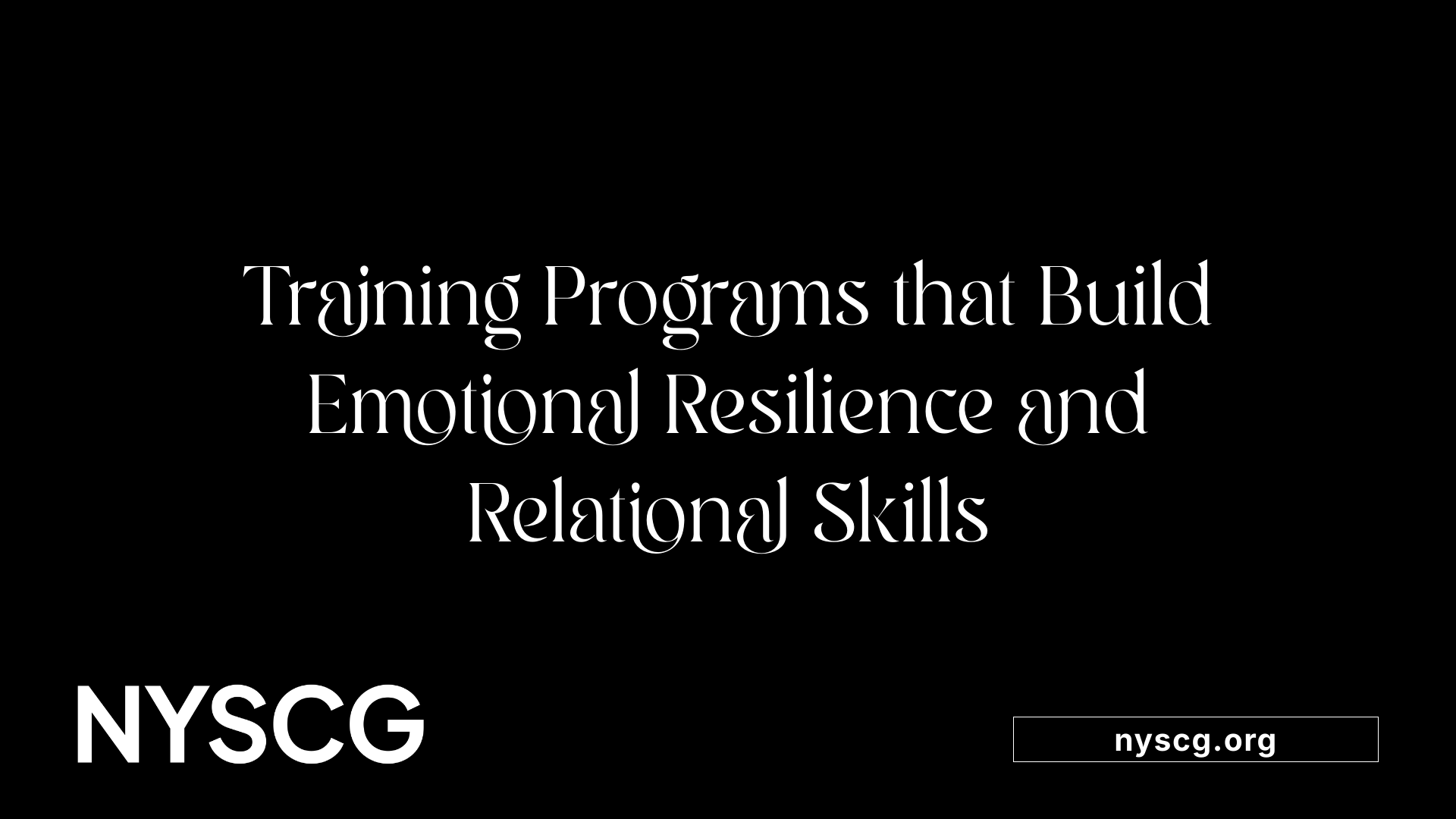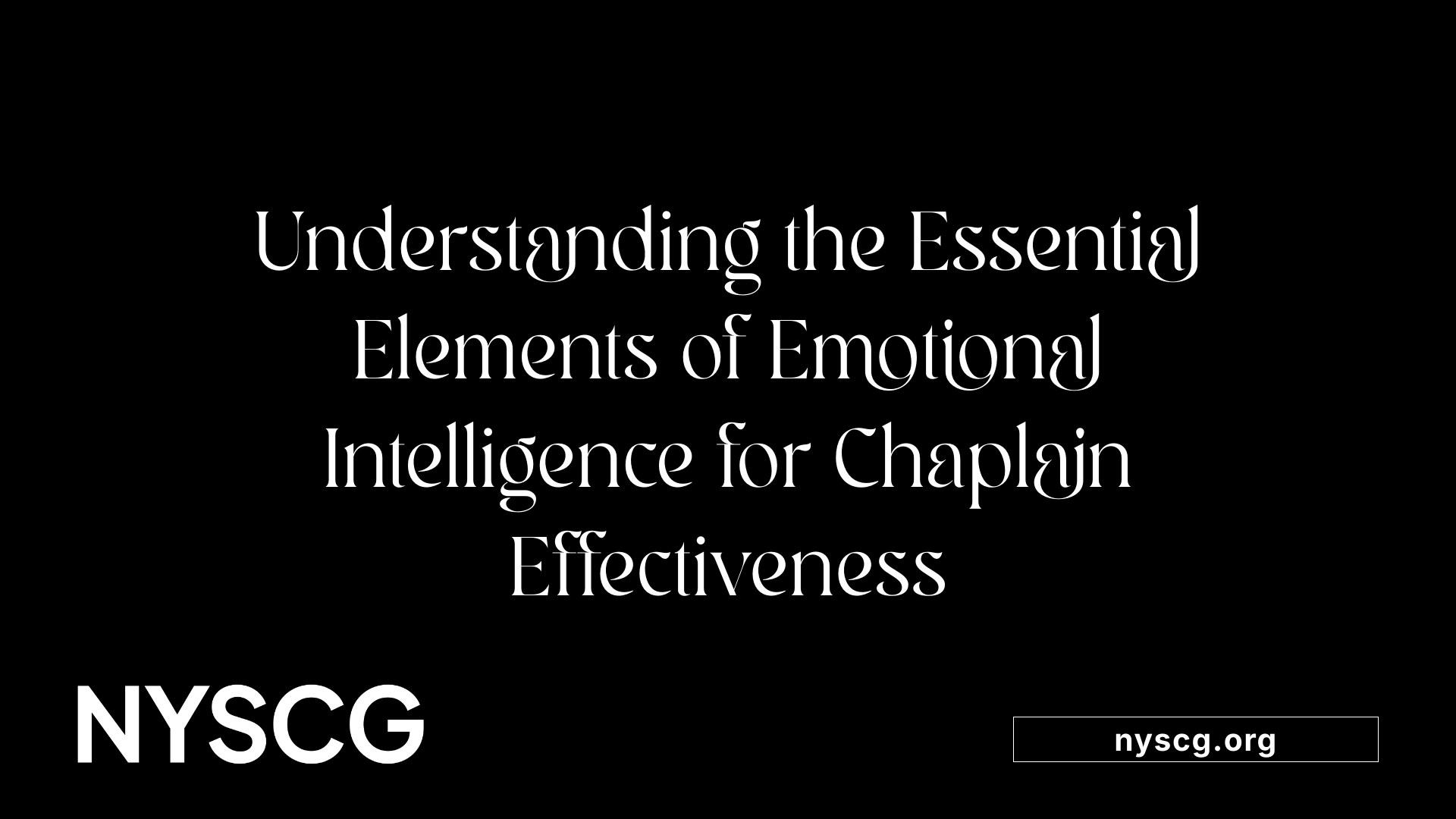How Emotional Intelligence Is Cultivated in Chaplain Candidates


Emotional intelligence (EQ) is a vital component in the training and professional development of chaplain candidates. As they prepare to serve in diverse and often emotionally charged environments—ranging from military settings to hospice care—these future spiritual caregivers must cultivate skills that enable them to navigate complex emotional landscapes. This article explores the methods, educational strategies, biblical foundations, and program elements that foster emotional intelligence in chaplain candidates, emphasizing its importance for effective ministry and supportive service.

Developing emotional intelligence (EI) in chaplain candidates involves a multifaceted approach that combines practical experience, reflection, education, and spiritual insights.
One of the most effective ways is through experiential learning. Activities such as clinical practice, case discussions, and real-life scenario simulations allow candidates to practice identifying and managing emotions in a safe environment. These methods help foster self-awareness and critical reflection on personal emotional responses.
Reflective exercises are also essential. Techniques like journaling or debriefing sessions encourage candidates to analyze their emotional reactions and recognize patterns over time, enhancing their self-regulation and internal motivation.
Supervised peer group processes play a vital role by providing feedback and supporting growth through collaborative learning. In these groups, candidates share experiences, discuss challenges, and learn from each other’s perspectives, aiding in the development of empathy and social skills.
Didactic instruction and role-playing complement experiential methods by teaching foundational concepts of emotional intelligence. Role-playing, in particular, provides practical opportunities to practice active listening, empathy, and conflict resolution in a controlled setting.
Programs like Clinical Pastoral Education (CPE) are especially beneficial, as they involve diverse group interactions and focus on diversity awareness, communication skills, and boundaries training. These elements collectively improve emotional regulation and relational skills.
In addition to practical training, integrating biblical and theological insights related to emotional intelligence can deepen candidates' understanding of compassion, patience, and forgiveness. These spiritual principles support emotional well-being and reinforce their pastoral responsibilities.
In summary, a well-rounded approach utilizing experiential learning, reflective practices, peer support, instruction, role-playing, and spiritual insights can effectively cultivate emotional intelligence.
MethodDescriptionBenefitsExperiential learningClinical practice, case discussions, simulationsEnhances self-awareness, critical thinkingReflective exercisesJournaling, debriefingPromotes self-regulation, emotional insightPeer group processesGroup sharing, feedback sessionsBuilds empathy, communication skillsDidactic instructionLectures, workshopsFoundations of emotional intelligenceRole-playingSimulated interactionsPractical skills in active listening and empathyTheological integrationBiblical insights on compassion and patienceReinforces spiritual and emotional growth
By combining these methods, chaplain candidates can develop a balanced and profound emotional intelligence that enhances their pastoral and counseling effectiveness.

Educational and training programs play a vital role in nurturing emotional intelligence (EI) among chaplain candidates, equipping them with skills essential for effective service in challenging environments. These programs are carefully designed with a variety of instructional methods, including specialized coursework, experiential learning activities, and biblical-based teachings.
Curriculum design often incorporates modules on emotional awareness, communication, crisis intervention, and relational wisdom. For example, the Christian Leaders Alliance’s Kingdom Chaplain specialization offers coursework that emphasizes trauma-informed care and grief support, fostering emotional sensitivity and relational competencies. Likewise, the Basic Chaplain Course emphasizes skills in counseling, crisis response, and grief management, with dedicated lessons on EI principles and stress management.
Experiential learning components such as role-playing, simulation exercises, and reflective journaling help candidates practice applying EI skills in real-life scenarios. These methods promote self-awareness, empathy, and effective conflict resolution—tools crucial for navigating the complex needs of military families and personnel.
In addition to these practical elements, biblical teachings are integrated to deepen understanding and align emotional intelligence development with Christian values. Resources like Relational Wisdom 360 (RW360) focus explicitly on biblical principles of relational and emotional intelligence, strengthening chaplains’ capacity to serve with compassion and resilience.
Overall, these programs help candidates build emotional resilience, improve interpersonal skills, and develop a biblically grounded understanding of relational dynamics. Through continuous reflection, mentoring, and hands-on experience, chaplain candidates grow in their ability to support others effectively, fostering trust, unity, and healing in their communities.

Understanding emotional intelligence (EQ) is vital for effective chaplaincy, especially in the demanding environments of military and hospice care. The main elements of EQ that are essential for chaplain training encompass self-awareness, self-regulation, empathy, social skills, and motivation.
Self-awareness enables chaplains to recognize their own emotions and understand how these feelings influence their behavior. This authenticity fosters trust and allows chaplains to lead with integrity. Self-regulation involves managing emotions appropriately, maintaining composure in stressful or conflicting situations, and adapting to the needs of those they serve.
Empathy stands at the heart of pastoral care, allowing chaplains to genuinely understand and resonate with the emotional states of individuals and communities. This depth of understanding leads to more compassionate and effective support.
Social skills, including active listening and effective communication, are crucial for building relationships, resolving conflicts, and offering pastoral guidance. These skills enhance the ability to influence and support others positively.
Internal motivation drives chaplains to continue providing service with purpose, even in challenging circumstances, fueled by a desire to serve others and uphold moral and spiritual principles.
Developing these elements of emotional intelligence equips chaplains to foster trust, manage complex emotional scenarios, and lead with compassion. Incorporating EQ training into chaplain education programs ensures they are prepared to meet the emotional and spiritual needs of military personnel, families, and those in hospice care.
To equip future chaplains with strong emotional intelligence, educational programs should involve a variety of experiential learning techniques. Role-playing exercises and scenario-based training allow participants to practice empathy, active listening, and emotional regulation in realistic contexts, fostering practical skills and self-awareness.
Mentorship also plays a vital role. Pairing chaplain candidates with experienced mentors offers personalized guidance, role modeling compassionate communication, and provides valuable feedback. This one-on-one support helps develop confidence and relational skills essential for high-pressure situations.
Reflective journaling encourages self-awareness by prompting chaplains to examine their emotional responses and spiritual growth. Regular writing fosters humility, self-acceptance, and a clearer understanding of their emotional and spiritual journey.
Group discussions and peer learning sessions deepen understanding of emotional and spiritual challenges faced in ministry. Discussing real-life dilemmas promotes empathy, cultural sensitivity, and interpersonal competence.
A crucial aspect of training involves strategies for building trust quickly. Chaplains should learn nonjudgmental communication techniques and emotional attunement to foster genuine connections, especially in stressful or sensitive environments.
By integrating these practices, chaplaincy programs can cultivate emotionally intelligent leaders capable of providing compassionate support and building resilient spiritual communities.
Practice MethodDescriptionEffectExperiential LearningRole-playing, scenario-based exercisesBuilds empathy, active listeningMentorshipPairing with experienced mentors for guidancePersonal growth, models compassionReflective JournalingDaily or weekly writing to assess personal reactionsSelf-awareness, humilityGroup DiscussionsPeer dialogue on challenges and experiencesInterpersonal skills, empathyTrust-building TrainingTechniques for establishing trust rapidly in high-pressure situationsRelationship development
This blended approach ensures that future chaplains not only learn theoretical concepts but also develop practical, relational skills necessary for effective ministry.

For chaplain candidates, cultivating emotional intelligence (EI) is a critical step toward becoming effective spiritual caregivers. EI equips them with the ability to understand and manage their own emotions, which is vital for maintaining resilience and avoiding burnout amid the emotionally charged environment of healthcare and military settings.
Empathy, a core component of EI, allows chaplains to genuinely connect with patients, their families, and colleagues. This empathetic engagement fosters trust, facilitates active listening, and creates a compassionate presence that resonates deeply with those they serve.
In crisis situations or when facing moral dilemmas, self-awareness and self-regulation—two important EI skills—enable chaplains to respond thoughtfully and calmly. This ensures that their support remains impactful and morally grounded.
Moreover, EI enhances a chaplain’s ability to deliver patient-centered care by interpreting emotional cues accurately. This sensitivity allows them to provide tailored spiritual guidance that respects individual needs and circumstances.
Research highlights that developing emotional intelligence not only boosts professional effectiveness but also enriches spiritual sensitivity. It helps chaplains navigate complex emotional landscapes, strengthening their ability to serve with compassion and moral clarity.
Overall, emotional intelligence fosters resilience, deepens trust, and promotes a caregiving approach rooted in empathy. These qualities are essential for chaplains who aim to offer holistic support—spiritually, emotionally, and morally—during life's most vulnerable moments.
Research and studies show that incorporating evidence-based approaches into chaplain training can significantly improve emotional intelligence (EI) skills, which are vital for effective ministry. For example, Clinical Pastoral Education (CPE) programs have demonstrated positive impacts on chaplains by enhancing self-awareness, confidence, and clinical skills, including listening, emotional regulation, and spiritual assessment.
Empirical data also support merging biblical understanding of emotional intelligence with practical training. This combined approach offers a comprehensive framework that connects scriptural insights—such as compassion and humility—with techniques for managing emotions and promoting self-care. This integration not only fosters healthier ministry practices but also strengthens the ability to navigate complex emotional and spiritual needs.
Studies indicate that participation in CPE enhances leadership capabilities, teamwork, and boundary setting among chaplains, thereby increasing their effectiveness and resilience in high-stress environments. The research emphasizes that developing emotional intelligence through these programs improves relational skills and cultural sensitivity, equipped to better serve a diverse range of individuals.
Overall, evidence points to the importance of making EI a core component of chaplain education. The findings recommend that training programs utilize practical pedagogies—such as reflective journaling, assessments, and scenario-based learning—to cultivate emotionally intelligent practitioners. These strategies prepare chaplains not only to support others compassionately but also to sustain their own well-being in demanding settings.
Aspect of EIResearch InsightsApplication in TrainingSelf-awarenessImproves confidence and mindfulnessJournaling and feedbackSelf-managementReduces burnout and enhances emotional regulationStress management exercisesEmpathyEnhances connection and cultural sensitivityRole-playing scenariosRelationship skillsBuilds trust and resolves conflictsTeam and leadership exercises
In the end, research underscores that integrating biblical principles with proven pedagogical methods in EI training equips chaplains with the skills essential for compassionate, effective spiritual care.
Developing emotional intelligence in chaplain candidates is a multifaceted process that integrates experiential learning, biblical insights, and structured curricula. Programs like CPE and targeted workshops facilitate growth in self-awareness, empathy, and relational skills crucial for effective ministry. As research continues to underscore the significance of emotional competence—particularly in high-stress environments like the military and hospice care—institutions are emphasizing the importance of deliberate, ongoing training. Equipping chaplains with robust emotional intelligence not only improves their support capabilities but also enhances their spiritual leadership, resilience, and capacity to serve with compassion across diverse settings, ultimately strengthening the integrity and effectiveness of spiritual care worldwide.
All you need is the will to make the world a better place.
New York State chaplain group inc. is a tax deductible organization with a federal tax Id number 92-383-4921